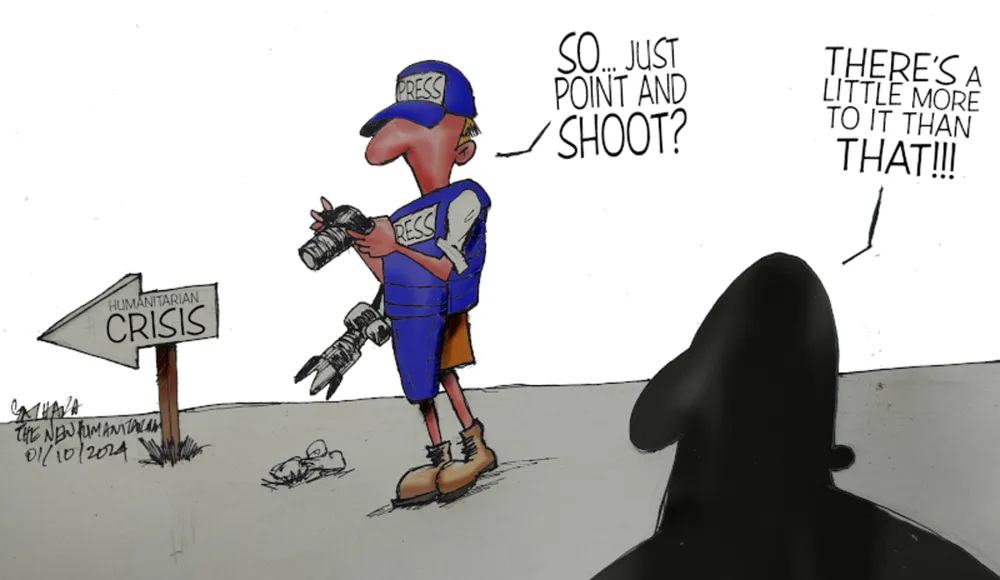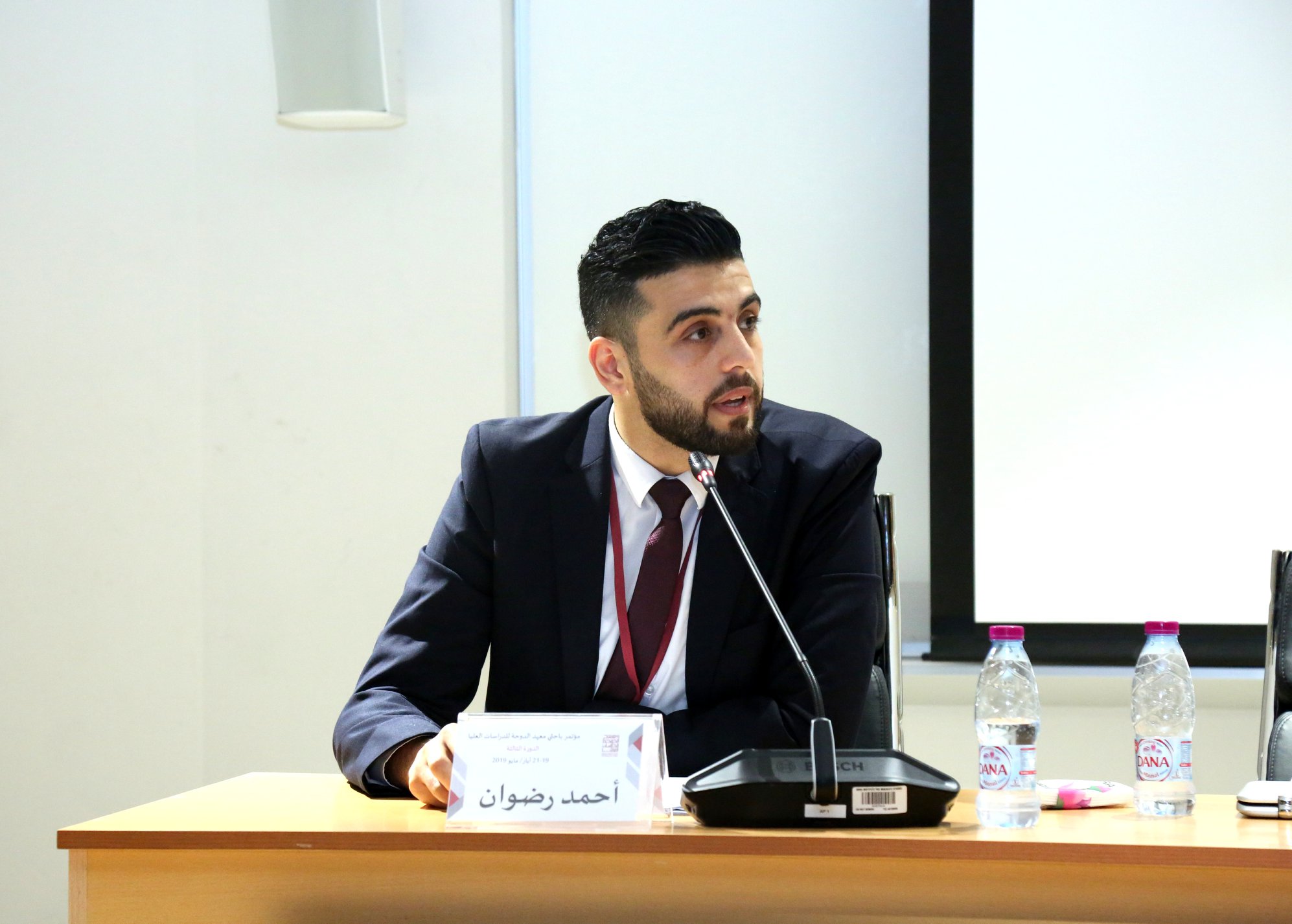This story was originally published by The New Humanitarian on 10 October 2024
In 2010, I was working for a UN-funded project to help the African Union Mission in Somalia, as it was then known, better communicate its goals and achievements. Part of the job was to help with media embeds, and one of the first that I worked on involved a tenacious 26-year-old who was trying to build a career as a foreign correspondent and war journalist. Jane Ferguson would go on to become one of the most recognisable Western journalists covering the conflict zones of the Global South.
Just two years before, Ferguson had been covering business and sports in the United Arab Emirates, but, as she told the Christian Science Monitor, she “wanted to be out on the road, telling stories that really mattered." She took work as a freelancer, covering the war beat for some of the world’s biggest newsrooms. When she came to the Somali capital, Mogadishu, she was freelancing for CNN.
“To stand in a hospital with a camera and not a stethoscope, to offer no tangible help to the person suffering in front of you, to voyeuristically witness their suffering—all of this is grotesque”
Thinking back on those days got me wondering: Just how is reporting business and sports a preparation for covering some of the most complex situations in the world? How prepared was she to face the ethical dilemmas that such coverage would inevitably throw up? “To stand in a hospital with a camera and not a stethoscope, to offer no tangible help to the person suffering in front of you, to voyeuristically witness their suffering—all of this is grotesque,” she details in her memoir, No Ordinary Assignment.
In the book, Ferguson details a conversation she had had with the late British war photographer Tim Page in Afghanistan the year before, which opened her eyes to some of the ethical problems rife in the genre she was joining. “I had come to cover a war, not a country, a people,” she writes. “This obsession with being a war reporter was bullshit. It was a total distraction from the real work, which was capturing [people’s] experiences of war.”
Today, “international” news is still dominated by wars, disasters, and conflicts—and the humanitarian crises they generate. Mainstream coverage of situations from Ukraine to Gaza to Lebanon to Sudan to the Democratic Republic of the Congo is largely the domain of a few “international” journalists. However, while many media companies send their war reporters to specialised war training classes to learn basic survival skills and to raise their awareness of the different dangers they might face, it is doubtful they are any better prepared than Ferguson to cope with the ethical questions their profession raises. And many are still trying to cover the event—be it a war or a natural disaster—rather than the people and societies impacted by it.
“I had come to cover a war, not a country, a people. This obsession with being a war reporter was bullshit. It was a total distraction from the real work, which was capturing [people’s] experiences of war.”
Much of the dissatisfaction with how such situations and the people impacted by them are covered may stem from the fact that covering humanitarian crises is nothing like covering a football game or a business deal. Sure, some journalistic skills and values are transferable, but fundamentally, approaches are different. One does not report on a football game to influence its outcome. On the other hand, ethical coverage of humanitarian suffering seeks, not grotesque voyeurism, but to end it.
All the different fields of modern journalism—such as investigative journalism, sports journalism, and opinion journalism—for the most part run on a similar set of ethical rules based on Western cultural precepts. These have been canonised in codes of ethical practice that impact how reporters in these fields act and what they see as the purpose of their reporting.
Nowhere are these ethical norms and practices more challenged than in the coverage of humanitarian crises and in the related fields of war reporting and foreign correspondence. In contrast to most other journalistic domains, which involve explaining societies to themselves, these explain the suffering of exoticised communities on the other side of the globe to audiences back home. A lot of the time that happens within a context of profound ignorance about these othered places.
All the different fields of modern journalism – such as investigative journalism, sports journalism, opinion journalism – for the most part, run on a similar set of ethical rules based on Western cultural precepts. These have been canonised in codes of ethical practice that impact how reporters in these fields act and what they see as the purpose of their reporting.
This ignorance infects how stories are told, leading to event-driven, spotty, and episodic coverage that only presents snapshots of suffering, erases complexity, and does little to help audiences understand the root causes of the crises covered. It is no wonder that Page told Ferguson, in a phrase that challenges the very foundations of foreign reporting, “Basically, Afghans should be doing the thing themselves. They should be interpreting their own country.”
The book “Humanitarian Journalists: Covering Crises from a Boundary Zone” discusses the emergence of a “small but influential number of humanitarian journalists"—working" for outlets such as The New Humanitarian—who are challenging journalistic norms as they apply to the reporting of humanitarian crises. These people see their journalism as informed by a mix of journalistic and humanitarian principles, and its ultimate goal as being in the service of those in the midst of crises. The New Humanitarian’s mission, for example, is to “produce fact-based journalism from the heart of conflicts and disasters to build understanding of how to improve the lives of the millions of people affected by humanitarian crises around the world." It is not journalism for its own sake, but rather it aspires to be “guided by the communities we serve so that we better represent the issues that matter to them.”
Could mainstream media reporters, who specialise in covering wars and conflicts, be described as humanitarian journalists? It certainly sounds like that’s what Jane Ferguson would like to be doing. When she talks of wanting to cover parts of the world that do not get regular coverage, to focus on local experiences, voices, and perspectives, and on the human and humanitarian aspects of conflict—to cover people, not wars—she is articulating some of the main pillars of humanitarian journalism. It is the same when she wants to have an impact and improve lives.
The ethics will be different. Ingrained journalistic concepts such as the need for maintaining distance, unaffected "witnessing," and objective reporting will clash with humanitarian values that demand empathising with suffering, as well as increasing questions about the morality of impartiality in the face of oppression.
Humanitarian journalism is coalescing into a journalistic field in its own right with a unique combination of ethical values and principles. These demands mean that a seamless integration with other journalistic fields that would allow journalists to drift in and out without additional training may no longer be possible. A sports journalist wanting to do humanitarian reporting today will need to recognise that it is a field that requires much more than a basic journalistic sense and ability to survive in tough environments.
The ethics will be different. Ingrained journalistic concepts such as the need for maintaining distance, unaffected "witnessing," and objective reporting will clash with humanitarian values that demand empathising with suffering, as well as increasing questions about the morality of impartiality in the face of oppression. Journalists used to imagining themselves as inert messengers will struggle to navigate a world where the reporter cannot be divorced from the news.
Young (and young-at-heart) journalists dreaming of following in Jane Ferguson’s footsteps, travelling to exotic places, and uncovering significant stories should consider the ethics of doing so and weigh up how well equipped they are to tell the stories of other people. More importantly, large mainstream media outlets should consider the ethics of employing “international journalists” rather than letting local journalists “interpret their own country.”
These are issues that The New Humanitarian, the world’s oldest global newsroom dealing exclusively with humanitarian journalism, has long been grappling with. Next year, as we mark 30 years of doing so, we will look to develop a code of ethics with other newsrooms to guide those wanting to join the field—one that will inform how those affected by humanitarian crises can be better represented in the future.
–––––
The New Humanitarian puts quality, independent journalism at the service of the millions of people affected by humanitarian crises around the world. Find out more at www.thenewhumanitarian.org.

























![Palestinian journalists attempt to connect to the internet using their phones in Rafah on the southern Gaza Strip. [Said Khatib/AFP]](/sites/default/files/ajr/2025/34962UB-highres-1705225575%20Large.jpeg)




















